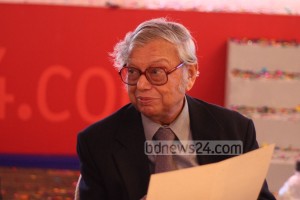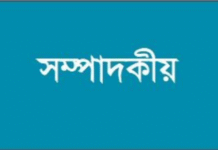Afsan Chowdhury
One of the finest gentlemen who walked this earth, certainly the leading historian of our time, Prof. Salahuddin Ahmed, has passed away at the age of 93. All his life he fought on to keep alive the cultural and intellectual space to which he belonged. It’s not easy because the world that birthed him was all but expired, but he battled on.
Prof. Salahuddin Ahmed continued to fight ignorance, religious fundamentalism, narrow nationalism and a general sense of social inequality. He represented what was one of the most optimistic times of our recent history — the 1940s — when it seemed a better world was just a revolution away. But his value structure didn’t emerge out of his confidence in history’s ability to deliver his socialist/radical humanist dream but of the liberal Western vision of Raja Ram Mohon – open, inclusive and built on the principles of European renaissance. His confidence was that these would be the values that would matter most to the South Asian people. History may have differed but he went on trying to be true to them.
To understand Prof. Salahuddin Ahmed is to understand the ‘second enlightenment’ in Bengal which came over a hundred years after the first, birthed by the Socialist revolution in Russia. If the (first) Bengal renaissance of Vidyasagar was fired by the idea of liberating Bengal from its arcane past, the second revolution was fuelled by the desire to embrace the future envisioned through socialist eyes. Radical nationalists were turning Communists all over and it changed several generations of people and the way they looked at life wanting to change it. It was Prof. Salahuddin Ahmed’s generation straddling two histories which became the bearer of new ideas, some of which took root and some which died in infertile soils.
***
He came from a highly educated Bengali Muslim family and both his father Abu Ahmed Faizul Mohi and his paternal grandfather Maulvi Ahmed were senior servants of the Crown in India. His maternal grandfather was Azizul Haque whose work on the classification of fingerprint methods is well known. All of them studied at the Presidency College Kolkata, which in many ways defined the social, cultural and intellectual flows of Prof. Ahmed. Therefore, he has to be read with the process that began its work once the British arrived with its post-feudal values.
It soon grew with the liberal tide of Derozio and Ram Mohon Roy and finally lapped at the shores of the great socialist nationalist heroes of Indian history when Indian politics reached its militant phase. They would be the just ancestors of the spirit of Prof. Ahmed. It was not the individual transfer of values that count but the collective spirit of the era some of which was secured over several generations and is significantly also sourced in major educational institutions. It was a construction of the cultural and intellectual sharaft of the New Indian, the ones that looked at life as a bhadrolok, middle class, intellectual, anti-colonial liberal democrat, Leftist, urban and so on.
That sums up Prof. Ahmed.
*****
Prof. Salahuddin Ahmed received his I.A. from Surendranath College, (formerly Ripon College) and B.A. (Hons.) in History from Presidency College (now Presidency University). He completed his first M.A. in History from Calcutta University and then a second M.A. in History from the School of Oriental and African Studies of University of Pennsylvania and his Ph.D. in History from the University of London.
Prof. Salahuddin Ahmed’s thesis explored social ideas and social change in 19th century Bengal. I encountered the book when I was doing my M.Phil coursework under Prof. Ahmed and was struck by the absolute brilliance of Prof. Ahmed’s work. His work was in many ways an intellectual contest of colonialism but also explained how social change influenced ideas to produce new cultural classes. It was a superbly drawn anatomy of the Bengal renaissance and how it was the kick off of Bengal’s new history. I came away not just with the satisfaction of having read an intellectual masterpiece focused on Bengal new liberals, but was also one of the most elegantly written and argued books of history I have ever read.
***
During this period, we were both involved in the same project working towards a common objective. I was a researcher in the 1971 History documents Project led by Hasan Hafizur Rahman and Prof. Salahuddin Ahmed was one of the members of the Authentication Committee that is the group who green lighted the documents that were to be included in the project volumes. The committee was chaired by Prof. Mofizullah Kabir of the DU History Department. I would like to recollect two incidents to exemplify what the intellectual environment was before it was torn apart by the present level of partisan politics. It should be remembered that it was 1978 under Gen. Zia and people were working in the shadow of the 1975 killings. Zia however, had no problem in granting this project led by Hasan bhai and never interfered.
Our work was to search and select the relevant historical documents of the nationalist history beginning from 1906. We workers had our leanings but not when it came to documents selection. We had found some documents on the 1966 political situation that were linked to Maulana Bhashani. When presented to the Committee, a member of the committee protested saying that the placing of the document just before the 6 points movement documents would reduce the significance of the Awami League led movement. We of course protested but the argument soon became quite strained.
It was the only time when the meeting was being presided over by Prof. Salahuddin Ahmed. He gave his ruling thus: “Our business is to collect relevant documents and include them in the volume. Judging whether one document is more significant than another is not our task. That’s for future historians to do. The document should stay. “
*******
Bangladesh didn’t emerge as a liberal democratic and socialist country after 1971 and therein lay the seed of dilemma for many of its intellectuals. Traditional Marxist liberals had to choose between two – the new regime with all its flaws or a counter regime that was against their stated beliefs. The situation was also a contest between the traditional rival gharanas of the socialist world, the pro-Moscow and the pre-Peking groups. For many of his kind, the decline of the socialist alternative amidst the inevitable ruins of post-war reconstruction became the great issue that they never addressed properly or didn’t wish to.
But almost immediately after birth, the produced state Bangladesh became quite distant from the utopian dream that powered so many to its fold.
When one-party rule was established by the Awami League in 1974 with the active support of the Communist Party of Bangladesh, one hopes it was a difficult time for Prof. Ahmed as this system was so far away from socialism and yet in its guise only created an oppressive structure, a violation of the main fundamental principles of the constitution. In a way, the post-1975 trauma after the demise of the one-party rule made life less conflicting for people of his ilk as they found a cause to defend in the political space insisting on secularism and socialism as primary state identities. Prof. Ahmed has always been close to non-communalism and inter-communalism and had even suggested having places of interfaith worship.
******
Till death intervened, Salahuddin Ahmed remained active and perhaps at no times before was he so daring in his will to defend his own citadel. He threw in his towel with the Awami League and was vehemently opposed to the BNP and its alliance with the Jamaat-e-Islami. In a way he became more partisan than he ever was, but to him the struggle went beyond the conceptual. He was defending his present but his past as well. There are many other elements in this equation but he took his stand and there was no dithering on his part. He became the intellectual activist, occasionally a polemicist. He became a multi-dimensional man. He became himself.
*****
To look at his life is to read the journey of an era through history. What began in the ancestral history of commitment to education gained strength in his lifelong commitment to learning and education. But he also made a great switch from that family tradition by serving his ideals instead of the Crown. It was pulled forward by his belief in a better world midwife by socialist ideals. That world failed to materialise but the personal integrity and socio-political principles continued to thrive no matter what. A life led without compromising his ideals, Prof. Salahuddin Ahmed remained the person he was when he passed out from the university and dreamt of a better world for which he fought all his life.
Thank you for being my teacher.
Source: bdnews24










